Moscow's Envoy Says Iran Deal Doesn’t Depend Just On Russia
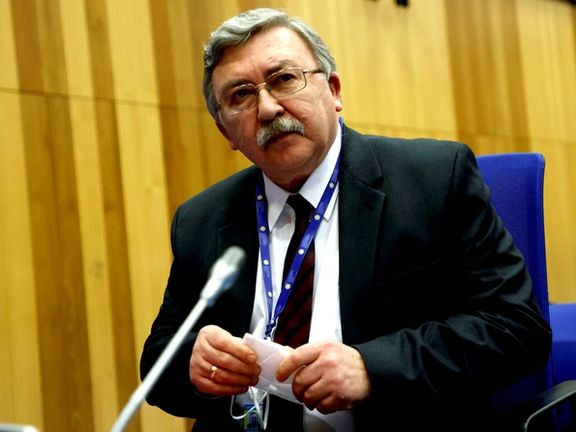
Following a pause in Iran nuclear talks, Russia’s lead envoy said negotiations will continue with all delegations during the pause to settle remaining issues.

Following a pause in Iran nuclear talks, Russia’s lead envoy said negotiations will continue with all delegations during the pause to settle remaining issues.
Speaking to reporters at the venue of the negotiations in Vienna on Friday, Mikhail Ulyanov said he is not aware of the pause called by EU Foreign Policy chief Josep Borrell, presumably over Moscow’s demands, adding, “I’m not aware of any impasse. Break? The Europeans left Vienna a week ago.”
He implicitly rejected the idea that the reason behind the pause is Russia’s demands for a US guarantee that its ties with Iran should be exempted from Western sanctions imposed for the invasion of Ukraine, stating, “The conclusion of the deal doesn’t depend on Russia only”.
Calls for a pause in Iran's nuclear talks gathered momentum as both Tehran and the European Union hinted at a temporary break, with Borrell saying that a draft text is "essentially ready", but hampered by "external factors".
"As coordinator, I will, with my team, continue to be in touch with all JCPOA participants and the US to overcome the current situation and to close the agreement", Borrell said on his Twitter account.
Iran's foreign ministry spokesman Saeed Khatibzadeh shortly after Borrell's statement tweeted that a pause in the negotiations "could be a momentum for resolving any remaining issue and a final return."
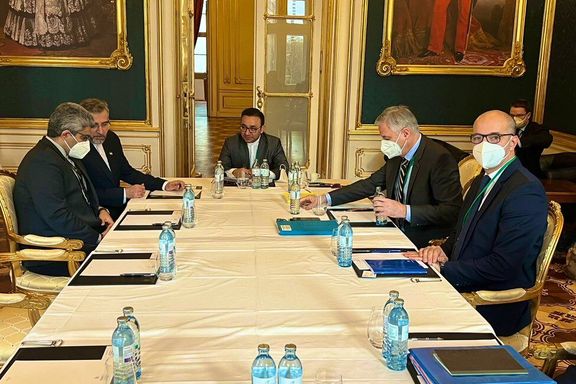
EU Foreign Policy chief Josep Borrell Friday called for a pause in Iran nuclear talks, saying that a draft text is "essentially ready", but hampered by "external factors".
Apparently referring to Moscow's demands to be exempted from sanctions over its invasion of Ukraine in its dealing with Iran, in a tweet Friday morning Borrell said a pause in Vienna talks is needed due to "external factors". He added that a "final text" to revive the deal, Joint Comprehensive Plan of Action (JCPOA), is "essentially ready and on the table."
"As coordinator, I will, with my team, continue to be in touch with all JCPOA participants and the US to overcome the current situation and to close the agreement," Borrell said.
Iran's foreign ministry spokesman Saeed Khatibzadeh shortly after Borrell's statement nodded agreement, tweeting that a pause in the negotiations "could be a momentum for resolving any remaining issue and a final return."
On Thursday the Politico said two diplomats have said that the talks in Vienna were on the precipice of collapse over last-minute Russian demands for exemption from sanctions.
Iran's official news agency IRNA Friday morning said "informed sources" have not confirmed the collapse of the Vienna talks, without mentioning the politico report. It also made no mention of Russian demands, blaming the US for delaying an agreement.
Iranian Foreign Minister Hossein Amir-Abdollahian also told Borrell in a phone call Thursday evening that the US is sending "mixed messages" to Iran and delaying the restoration of the JCPOA by introducing "new and unjustified but again did not make any mention of Moscow's demands.
He also insisted that Iran's demand for the lifting of sanctions on "[Iran's] national heroes", presumably the Revolutionary Guards (IRGC), was "non-negotiable". The former US administration designated the IRGC as a Foreign Terrorist Organization (FTO).
"No single party can determine end result; a joint endeavor is needed. Reason should prevail," the Iranian foreign minister tweeted after his phone call with Borrell, reiterating that a "good and durable agreement" was within reach if "the US acts realistically and consistently."
On Friday morning former Central Bank of Iran Governor Abdolnaser Hemmati in a tweet urged all Iranian official to support a quick deal with the US directly. "A hundred days ago I told [them] not to miss the opportunity for economic growth by 'negotiating with five different mediums [each with its own] interests'," he wrote, adding: "With the current oil prices the cost of delay in increasing crude oil exports is $4b [a month]."
A restored JCPOA would theoretically bring back Iranian fossil fuel to world markets but the energy infrastructures, both gas and oil, have been left in relative neglect in the past few years, particularly after the 2018 sanctions and it will take time, even years in the case of gas, to boost production.
The US State Department Spokesman Ned Price told reporters Thursday that a nuclear deal with Iran is "down to a small number of outstanding issues" which are nevertheless "among the most difficult ones" and stressed that Washington has urged all parties, including Russia, to focus on solving the final remaining issues.
However, he stressed that the "new Russia-related sanctions are wholly unrelated to the JCPOA" and Washington has "no intention of offering Russia anything new or specific" as it relates to the sanctions imposed for the invasion of Ukraine. "I will let the Russian Federation speak to what it is that they are seeking," he said.
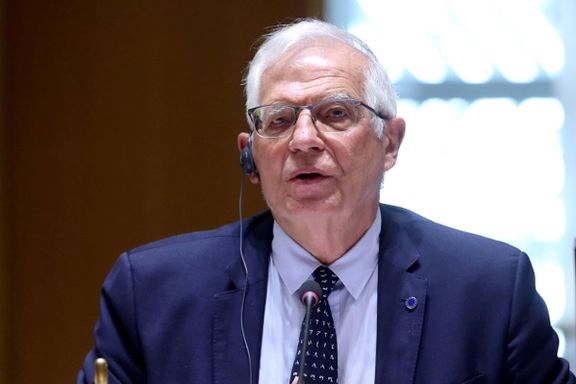
Calls for a pause in Iran's nuclear talks with world powers gathered momentum on Friday as both Tehran and the European Union hinted at a temporary break.
EU foreign policy chief Josep Borrell said on Friday a final text regarding the revival of the 2015 nuclear accord between Iran and world powers is "essentially ready and on the table" but a pause is needed in the talks due to "external factors."
Iran's foreign ministry spokesman Saeed Khatibzadeh shortly after Borrell's statement tweeted that a pause in the negotiations "could be a momentum for resolving any remaining issue and a final return."
The pause is apparently is the only option at a point where Russia has introduced its own demand in the talks, which requires a diplomatic solution. Moscow has demanded a guarantee from the United States that its ties with Iran should be exempted from Western sanctions imposed for the invasion of Ukraine.
"As coordinator, I will, with my team, continue to be in touch with all JCPOA participants and the US to overcome the current situation and to close the agreement", Borrell said on his Twitter account.
Other issues also remain to be solved between Washington and Tehran. State Department spokesman Ned Price said on Thursday that although few problems remain to be overcome, they are are important ones.
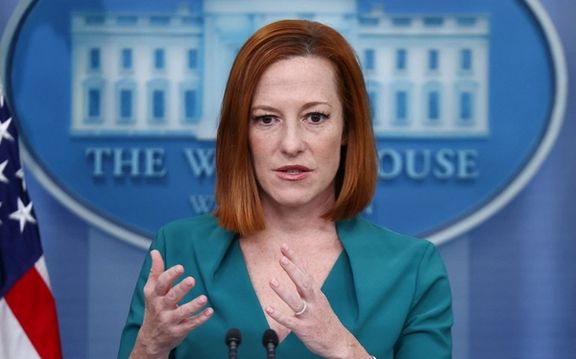
The White House said on Thursday the United States would continue to have diplomatic talks with Iran about a nuclear deal.
"Our view is that we are close. We have been close for some time now," White House spokesperson Jen Psaki said. "The end of negotiations is always when the difficult and challenging parts of the conversation typically take place."
Iran has refused to hold direct talks with the US. European countries and Russia have been acting as mediators in Vienna talks that began almost one year ago.
The United States and other participants in the Vienna talks have been repeatedly saying a deal is close in recent weeks. However, multilateral, formal session have ended in Vienna as diplomats say the time has come for political decisions.
The details of what issues still remain unresolved are not known, but Iran apparently has been demanding that its Revolutionary Guard be taken out of the US Foreign Terrorist Organization (FTO) designation.
Russia on Saturday introduced a new complicating factor into the already complex situation by demanding that its economic and other relations with Iran be exempted from sanctions imposed for of its invasion of Ukraine.
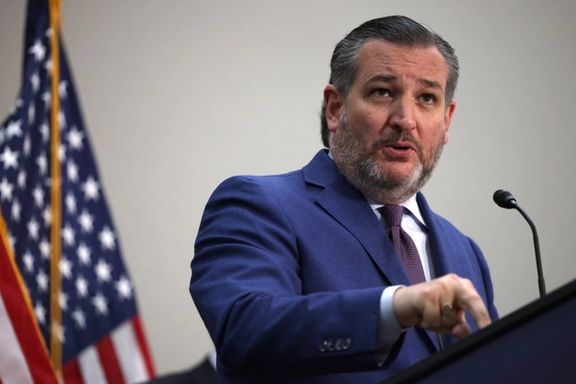
Groups of US lawmakers have expressed deep concern to President Joe Biden over a potential agreement in Vienna to revive the 2015 Iran nuclear deal, or JCPOA.
Nine Republicans and 11 Democrats House members in a letter obtained by the Jewish Insider said on Thursday, “it is hard to envision supporting an agreement along the lines being publicly discussed.”
The 20 signatories - led by Republican Tom Reed, and Democrats Josh Gottheimer and Elaine Luria – said they had hoped that “renewed negotiations with Iran would achieve a longer and stronger agreement than the JCPOA (Joint Comprehensive Plan of Action), with clear nuclear restrictions and provisions addressing Iran’s international terror and missile programs.”
The move came after a group of Republican lawmakers on Wednesday urged Biden not to make a deal in Vienna, saying it would be a big win for Russian President Vladimir Putin.
“Putin will make billions in oil and gas transactions, in nuclear transactions and in weapons transactions,” Republican Senator Ted Cruz leading the charge said.
Sen. Jim Risch, (R-Idaho), said the US should walk away from a deal being negotiated by Russia and Iran, “two of our worst enemies on the planet.”
“This doesn't need to be done right now,” Risch said. “And particularly, it doesn't need to be done when we have the problems going on that we have in the Ukraine. We should walk.”
The letter by 20 Representatives opposed “the potential lifting of the Foreign Terrorist Organization (FTO) designation of the Islamic Revolutionary Guard Corps (IRGC) and of the sanctions placed on members of the office of the [Iranian] Supreme Leader.” The measures cited were both introduced by Trump executive orders after his administration withdrew the US in 2018 from the JCPOA.
The signatories said Iran was “the world’s leading state-sponsor of terror,” and that easing sanctions would pave “a clear path for Iranian proxies to continue fueling terrorism,” a reference to Iranian allies deemed ‘terrorists’ by the US, including Palestinian groups and Hezbollah.
Support ‘contingent on answers’
The lawmakers listed 16 questions about the Vienna talks, claiming their support for any agreement in Vienna would “be contingent largely on satisfactory answers to the questions.” They urged President Biden to brief them within the next week.
The questions included whether any agreement would be reviewed by the Congress, something the Biden administration has already ruled out. The lawmakers said they wanted to be told exactly which US sanctions would be lifted, and what Iran’s ‘break out’ time would be – referring to the period required in theory to assemble a crude nuclear weapon, one greatly reduced since early 2021 when Iran began enriching uranium to 60-percent purity.
The Congressmen and women also wanted to know whether Russia might derive any economic benefits (presumably through trade with Iran), whether Russia would return Iran’s nuclear material if it decided the deal has been breached, and whether Russian President Vladimir Putin (presumable rather than mechanisms established under the JCPOA) would be de facto judge of compliance with the agreement.
They also demanded to know what would happen if Iran violated the agreement once the ‘snapback mechanism,’ allowing the reimposition of sanctions on Iran, lapsed in 2025; and exactly how much money Iran would gain from easing sanctions. They also demanded to be informed if the Biden administration would ask Congress to lift other sanctions in 2023, and how US ‘human rights’ policies might be affected by reviving the JCPOA.
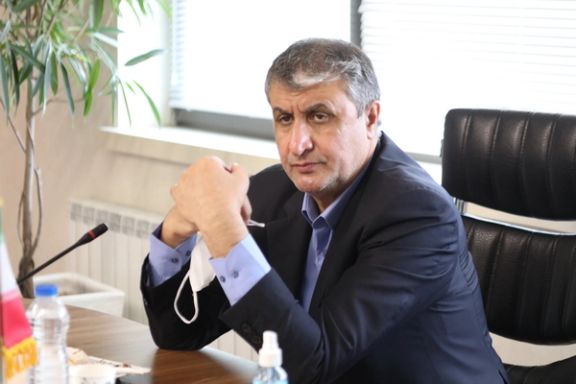
The head of the Atomic Energy Organization of Iran (AEOI) says the country’s nuclear industry is controlled from Tehran, not Vienna.
Mohammad Eslami speaking to a group of reporters in Tehran on Thursday stressed that Iran’s emphasis in the Vienna talks was on seeing sanctions removed. He added that Iran would meet its obligations under the 2015 agreement, the JCPOA (Joint Comprehensive Plan of Action), as sanctions were lifted in a verifiable manner and the necessary guarantees given by world powers. Eslami
Eslami said last week Iran was ready to clear up by June 20 outstanding questions raised by the International Atomic Energy Agency (IAEA) over Tehran’s nuclear work before 2003. While this is a requirement under Iran’s safeguards arrangements under the Nuclear Non-Proliferation treaty and not linked to JCPOA restoration, there has been speculation that the issue was muddying the Vienna talks.
In his report to the IAEA board meeting Monday, IAEA chief Rafael Mariano Grossi highlighted that “making progress on the clarification of the outstanding safeguards issues” with Iran remained an agency priority.
In Vienna Wednesday, the US Deputy Chief of Mission to the IAEA Louis Bono expressed “significant concerns” over Iran’s responsibility for transparency under the Nuclear Non-Proliferation ‘safeguards’ rules, noting that Iran needed to answer agency questions over its nuclear work before 2003 as “a legal obligation separate from its JCPOA commitments.”